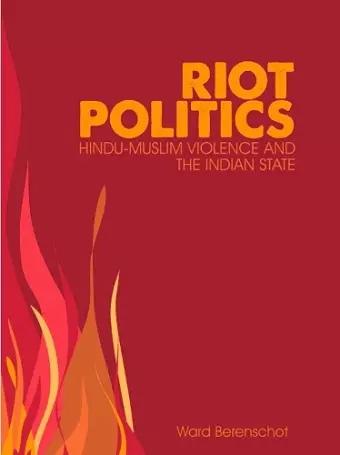Riot Politics
Hindu-Muslim Violence and the Indian State
Format:Paperback
Publisher:C Hurst & Co Publishers Ltd
Published:26th Jan '12
Currently unavailable, our supplier has not provided us a restock date

On 27 February 2002 fifty-eight people died when a train coach caught Western India. The incident marked the beginning of one of the worst outbursts of Hindu-Muslim violence since India's independence. As marauding mobs thronged the streets of Gujarat's cities and villages, local and state-level politicians aided and abetted the violence by making inflammatory speeches, distributing weapons and restraining the police -- who largely sided with the state's majority Hindu inhabitants -- from intervening to stem the bloodshed, which claimed the lives of over two thousand people. Based on an extensive ethnographic study of Gujarat's local politics, Riot Politics offers a novel approach to understanding the processes that foster outbursts of communal violence in India. Berenschot argues that the difficulties that especially poorer citizens face when dealing with state institutions underlie the capacity and interests of political actors to instigate and organise communal violence. As the reader is led into the often shadowy world of local politics in Gujarat, the author reveals how the capacity and willingness of various types of rioters - from politicians, local criminals, Hindu-nationalist activists to neighbourhood leaders and police officials - to organise and perpetrate violence is closely related to the different positions these actors hold in the patronage networks that provide access to state resources.
'An exciting new study of the relationship between political mediation and violence in Gujarat, this work is ethnographically rich, well written and theoretically ambitious.' * Professor Samira Sheikh, Vanderbilt University *
'The 2002 genocidal violence in Gujarat has remained partly unexplained. Focusing on the city of Ahmedabad, Ward Berenschot's book throws new light on these events, drawing on unique fieldwork emphasising the role of grassroot leaders. This is a remarkable addition to the literature on communalism in India.' * Christophe Jaffrelot, Senior Research Fellow, CNRS, CERI Sciences Po and author of Religion, Caste and Politics in India *
'Communal riots are part of the social history of Gujarat, but with the rise of political Hinduism the social fabric became torn apart more viciously. Ward Berenschot has focused his fieldwork on the political machine of metropolitan Ahmedabad and explains from an anthropological perspective how the neighbourhood-based agents of the commanding party heights tried to segregate people on the basis of their religious identity but were not always successful. His excellent study shows that communalism is a political act rather than a state of mind.' * Jan Breman, Professor Emeritus and Senior Fellow at Amsterdam Institute of Social Science Research *
'Outbursts of communal violence in India are often portrayed as aberrations, as moments of collective madness interrupting a lively liberal democracy. Nobody can maintain that position after having read Ward Berenschot's meticulously researched and robustly argued study of local politics and violence in Gujarat. Berenschot demonstrates that organizing, preparing and imagining communal violence - real or potential - is endemic to the way democracy, identity and political power functions at the level of neighborhoods and streets in India's economic powerhouse. A must read for anyone interested in the political sociology of violence.' * Thomas Blom Hansen, Professor of Anthropology, Stanford University *
ISBN: 9781849041362
Dimensions: 216mm x 138mm x 15mm
Weight: unknown
320 pages